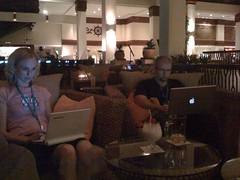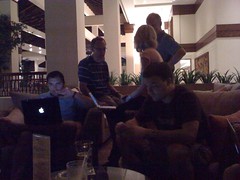I love learning. I used to love professional conference too – mostly because they were a great place to learn. But, last weekend, at our regional teacher’s conference (ETC), I made a realization, well two, realizations:
1. I get more relevant, interesting, and informative information via my PLN than I could hope to get at even the best professional conference experience – and without having to leave the country or spend a cent.
Therefore:
2. For me, conferences are no longer primarily about learning, at least not in the traditional sense of attending lectures, doing activities and taking notes.
 Yikes! I guess I probably could have seen this coming. I mean, you can’t get as much exciting and engaging material as I do from my PLN without raising your expectations for a professional learning experience a little bit. But, somehow, before I left for ETC, I was still in the mindset that this conference would be a place to push my thinking, to expose me to new ideas, to put my learning on hyper speed.
Yikes! I guess I probably could have seen this coming. I mean, you can’t get as much exciting and engaging material as I do from my PLN without raising your expectations for a professional learning experience a little bit. But, somehow, before I left for ETC, I was still in the mindset that this conference would be a place to push my thinking, to expose me to new ideas, to put my learning on hyper speed.
What I realized is that I often get better information through my RSS reader and Twitter than I do via more traditional, formalized educational experiences like a conference. While I learned something new from every session I attended, there were a few sessions where I was glad to be able to sit within range of the wifi and go through my reader, finding exactly what I needed at that moment. This wasn’t because the presentations were lacking, it’s just that I’m starting to realize that there’s a limit to what I can gain from a pre-constructed session, devised for a broad audience, about something that might only be indirectly related to my learning needs.
 Now, this is not to say that this particular conference wasn’t useful (I did learn a lot about teaming – although I probably could have learned all of that from a book – and saw a fantastic session on developing a classroom community led by my new friends Sam and Chad), or that I don’t think conferences in general are useful. In fact, quite the opposite. Last weekend I realized that conferencing is all about people: connecting, building relationships, finding new paths and solidifying old (or virtual) friendships.
Now, this is not to say that this particular conference wasn’t useful (I did learn a lot about teaming – although I probably could have learned all of that from a book – and saw a fantastic session on developing a classroom community led by my new friends Sam and Chad), or that I don’t think conferences in general are useful. In fact, quite the opposite. Last weekend I realized that conferencing is all about people: connecting, building relationships, finding new paths and solidifying old (or virtual) friendships.
At this particular conference, I had the absolute pleasure to meet and spend some quality time with Keri-Lee, Ryan, Adrienne, Sam, and Chris; as well as see Steve, David, Kendra and Debbie again. I had some great conversations with my wonderful colleagues Jeff and Chrissy that we may not have had the time or the energy for at school. I discovered connections with Jeff and Eduardo, and I’m sure I crossed paths with quite a few more familiar “usernames” as well.
 I might not have gotten something new from every single session, but I did meet at least a dozen people who were already in my personal learning network.
I might not have gotten something new from every single session, but I did meet at least a dozen people who were already in my personal learning network.
I may not have attended every session, but I participated in deep, thoughtful conversations with people I had just met, about ideas we found relevant and important to our learning.
I didn’t find myself in awe of any specific presentations or the information I learned from them, but I reveled in the power of my personal learning network to help me make connections, push my thinking, and expand my horizons.
So, I guess what I’m saying is that I’m looking at conferences differently now. Like Jeff, I don’t like learning alone. But, I think we can make our conferences all about learning together – we just might not want to follow the pre-determined program… I guess we’ll have to make our own.
Has your perception of conferences changed now that you’ve built a PLN? What about our students? Is this how they feel while they’re in school? As educators, should we expect that students can learn more from their PLN than they can from us?





Wow Kim – you pose some great questions here. I too was at the EARCOS conference last month. It was the first one I had attended in a while, and I was there without husband and kids. I took away a different feeling from the experience. I was inspired by many of the presenters – the keynotes, the general presenters and the teacher presenters (like yourself) – and came away feeling energized and motivated. I felt I had been given new things to think about. I do agree with you that one of the best things about conferences is the chance to connect with others face to face. Often this means reconnecting, but it can also mean striking up new professional relationships. I had a lot of this going on in Borneo.
Sure, your PLN is just that – personal – and a conference cannot be that, yet it still can be as valuable an experience.
You make a good point about our students feeling this way. Trying to make the learning personal for them is one of the hardest parts of being a teacher. I think we are some way from replacing the classroom teacher with a computer with high speed internet though!
Thanks for all your thought-provoking work and prolific blogging.
Nadine
Thanks Kim,
It was a pleasure to spend time chatting to you and getting to know the person behind the online ‘voice’. I look forward to catching up in the future in person, and online whenever I can!
Keri-Lee
Hi Kim,
One of the things I have noticed about the conferences in this part of the world is that there is a bit of a “conference circuit” that seems to have the same people attending and presenting. Many of these people are also on Twitter, have blogs etc. What this seems to lead to is a sort of “echo chamber effect” where we are all hearing the same things from the same people. I can imagine that a lot of the people who attend the Apple event later this month will be the same connected people who went to Learning 2 in Shanghai and will also go to the 21st Century Learning Conference in September.
Part of the reason for this, IMHO, is that there are only a few schools big enough and “with it enough” to pay the money to send staff and accommodate them in hotels in resorts like KKB.
Spreading the word to other schools is very tough. I interviewed for a leadership position at a HK school last week and nearly choked when they told me the package. Suffice to say that it was around 25% less than an international school and this school is an IB world school! I would have been still interested except that when I asked about professional development, it was very clear that anything outside of HK would not be entertained.
If we could somehow find a way of getting the message to schools like this that there is another way then I think that there would be some very keen groups of teachers ready to benefit from the step up to forming an online PLN for many of them.
I think international schools give some great opportunites to teachers and students but many of them are very closed communities. Perhaps there is an opportunity leveraging ICT for communication and collaboration to be a bigger part of the CAS component of the IBD? Food for thought maybe?
Cheers
Paul
I feel exactly the same way. Recently I went to the Council for Exceptional Children’s conference in Seattle but because I’m on the Board of Directors, I didn’t get to attend any sessions. I used to be disappointed in this but like you, I learn so much from my RSS reader, Plurk, and Twitter that it isn’t such a big deal to me anymore. The connections and conversations that I’ve had at other times are more important to me. Thanks for sharing!
hi,
i’m chris. i’m a library media specialist here in the bronx ny.
many years ago i was a student at the international school in bangkok.
nice to meet you.
i will follow you on twitter.
i am infodivabronx
Whole-heartedly agree Kim. The resources, links and, ultimately, learning that I have experienced in the last few months of being on Twitter has been amazing. Thanks for introducing me to it some time ago.
I agree with you! Since blogging in late August, I have learnt more from my PLN and Google Reader than any PD session. The only downfall is it takes me a good 1.5 hours to go through my reader a day. Collaboration and motivation are my new slogans. Good post! There seems to be a lot of this floating around recently in the blogosphere.
Hey Kim, I am new to your blog and you raise all kinds of issues I wrestle with too in my work as a school consultant. It doesn’t really make sense to go to conferences anymore for “information” but for working together with people, and for creating webs of connection for back home. Also, I love the public aspect of learning in teams, something we’ve been so acculturated not to do. Thanks for this and for your thoughts! I look forward to getting to know you.
1) Has your perception of conferences changed now that you’ve built a PLN? Absolutely. Your description is similar to my experience. Thank you. Nice story telling
2) What about our students? Is this how they feel while they’re in school? I suspect in most classrooms they feel their time is being wasted, but in those same schools and classrooms students don’t know what a PLN is.
3) As educators, should we expect that students can learn more from their PLN than they can from us? If we want them to be self-directed, like-long learners, you are a perfect model!
Here’s my thoughts on one of your statements in the post.
“…a place to push my thinking, (What are the “places” I can go to push my thinking? What questions are worth seeing throught ot answers?)
to expose me to new ideas, (What ideas are old? What causes them to become old? How would I define a new idea? Is one enough? How many new ideas do I need this week, this month? How many new ideas are too many? Is there a balance I need to strike between old and new ideas? Do I have a role to play in making old ideas fresh?)
to put my learning on hyper speed.” (What fuels learning on hyper speed? What does it look like? Do you accomplish more when learning is on hyper speed? What do you accomplish in this state that’s of value?)
I agree with a lot of what you say in this post. As I’ve become more involved in my PLN, resources and ideas are being shared at a pretty rapid pace. In a lot of cases, I bookmark the link planning to check it out later, only to have it pushed to the back burner for the next idea that comes around. I recently attended a conference and felt like much of the information shared in some of the sessions was not new to me. Perhaps this is a sign that I’m not a beginner anymore. The connections are certainly important and I look forward to that as much, if not more, than the sessions themselves. I know I’ll continue to learn at conferences, but like you said, it’s not the same as it used to be several years ago.
Hi Kim, great post.
I organise a conference for Teachers called Treasuring Education. From these conferences I get a diverse range of feedback. The one consistent thing participants say is that the most important thing to them were the opportunities to network. They loved the topics, enjoyed the presenters, and the food and beverages were great, but it was the connecting and building relationships that count for them.
@Nadine,
Good to hear that you had a positive experience at the ETC! I think I’ve become a little spoiled with the constant learning I feel that I have at my fingertips through my understanding of networked learning and an amazing PLN! I remember when conferences were my source of inspiration throughout the school year and I am so appreciative that I am able to have that experience pretty much every day now through Twitter, RSS and social networking tools.
@Keri-Lee,
It was such a pleasure to meet you! If for no other reason, it’s worth attending regional conferences just to meet colleagues face to face. The casual conversations you can have when you already “know” someone from online conversations are so powerful.
@Paul,
I wonder if the people on the “conference circuit” you mention are the ones who really value sharing and are willing to spend their own money, time and energy to attend and present. It’s a lot more work to present at a conference than it is to attend. For me, it was very intimidating to present for the first time, but once I had the opportunity (when I was working in Munich) I realized just how valuable it would be for my professional growth. Now I’m willing to dedicate lots more of my time and energy to make presentations.
@Pat,
Agreed! I totally appreciate the opportunity to connect in person, and wish that conferences promoted more unconference sessions that allow for more of those in-depth conversations we can have online…
@Chris,
Great to connect with you! I bet ISB has changed a lot in those last 9 years! We’re still at the Nichada Thani campus, though and I bet quite a few of your high school teachers are still here :)
@Ben,
Agreed! I am so thankful that we have the opportunity to make these kinds of connections online – it’s so worth it!
@Frank,
It’s amazing how much you can learn from your network. Aren’t we lucky?
@Kristen,
Yes! I totally agree of creating webs of connection! Regional conferences are great way to build those kinds of local connections that can sometimes be hard to find online.
@Dennis,
Thanks for all those thought-provoking questions. One that really struck me is “what causes ideas to become old?” One thing I’ve been thinking a lot about lately is how perceived “old” ideas (like project-based-learning, which I learned about in grad school) have become “new” again, and how we keep revisiting “old” ideas in new ways. Maybe ideas never get old, maybe we just need a new lens to look through? Thanks for pushing my thinking!
@Chad,
I totally agree – the ideas and inspiration come faster than I can process them in my new mode of networked learning. But one thing I really appreciate is being able to go back and find those ideas I passed by the first time around, and the fact that I know the best ideas will be repeated (and retweeted) until I have a moment to see them. It’s an exciting time for learning, that’s for sure!
@Tim,
Agreed – it’s the networking that is the most powerful. More time to connect and collaborate is, in my opinion, what’s needed (instead of presenters talking at their audience).